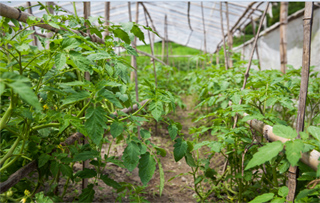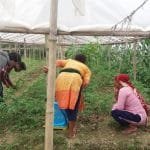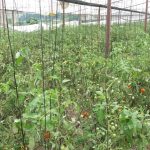
Nepal’s economy is agriculture dominated as it provides subsistence and employment for 66% of the population and accounts for approximately 24.26% to the total GDP. Nepal was once an exporter of rice but the country has to import food due to insufficient production. Nepali agro-farming is performed on a subsistence basis; with livestock, crops and other enterprises existing side by side, but generating inadequate surpluses for sale and inadequate returns for farmers. The development of the sector is crucial for the empowerment of those who rely upon it and for the national economy: a more commercial approach is needed to maximize farm yields through training in farming techniques and technical knowledge, expand income-generating opportunities, and address threats from soil erosion and water pollution.
The goal of the Agro-farm Project is to teach farmers in marginalized communities new farming techniques while preserving sustainable traditional practices passed down by their ancestors. In exchange, the volunteers will learn traditional farming practices. Developing sustainable agriculture is one of the most effective ways to transform communities, which informs one of our major pieces of work with the women of the community. Agriculture being one of the largest sources of income has a strong influence on the identity of the people within the community. The Agro-farm Project is a great opportunity for those involved in or studying agriculture, the environment or climate change to obtain an insight into culture and way of life in marginalized communities.
VIN seeks volunteers or interns keen to learn about the farming techniques of different indigenous people of Nepal, such as the Balami, Tamang and Newar, and to help disseminate technical knowledge and practices to enhance agricultural production and income-generating opportunities. You will live with a Nepali host family and will get immersed in the culture and language.
The farming volunteer/ intern will carry out of one or more of the following activities:
- Work effectively within the system of traditional Nepalese Agriculture.
- Assist in field exchanging knowledge of agriculture with the local people.
- Raise awareness within our targeted community about the dignity of labor and motivate them to start income generating agricultural enterprises.
- Help generate income from our farms and use that income to help improve the conditions of the rural communities.
- Train farmers making organic fertilizers like compost and involve yourself in the process.
- Conduct workshop on rotational farming and co-cultivation techniques.
- Bring visible changes to the livelihood of very vulnerable farmers within the local areas.
- Study the locals who engage in indigenous agricultural practices that one rarely finds anywhere else in the world.
- Provide technical know-how to the farmers without negatively affecting/disturbing their traditional knowledge and authentic techniques.
Project Specific Skills
- Education or work experience in agriculture- sustainable food production.
- Basic knowledge on farming techniques
- Facilitation and presentation skills
- Knowledge on composting procedures
Desirable/ Common Skills
- Excellent communicator with good interpersonal skills
- A team player with good workethics
- Time management and leadership qualities
- Adaptable, flexible and able to work under pressure
- Accepting of different ideas and culture
- Problem solving: always be part of solutions than part of a problem
- Creative
- Positive attitude
Requirements
- Gender: Female / Male
- Minimum Age: 18+ years (16-17 years old person can volunteer but need to present parents’/ guardian’s consent letter)
- Language:English (Intermediate)
- Educational:High School Graduate
Your Experience/ Setting
Upon your arrival at Kathmandu Tribhuvan International Airport (TIA), you will receive a warm welcome and be transported to your hotel or hostel. If you are already in Nepal before the start of your placement, we can make alternative arrangements for you. You will undergo a comprehensive two- to three-day induction program after arrival. This induction will provide valuable information about your project and general information about the Nepalese language, culture, health, safety, and security. It is also an excellent opportunity to connect with fellow volunteers and interns who can become your companions for sightseeing and a source of support throughout your volunteer placement.
During the induction period, you will be accommodated in a budget hotel or hostel arranged by VIN. However, most of the VIN experience involves living with a Nepalese host family. While this immersion is essential for a complete experience, we understand that it can be challenging as you adapt to a new culture and adjust to facilities that may be more basic than you are accustomed to. Don’t worry; all our host families have experience accommodating volunteers, although their English-speaking abilities may vary. Also, you will have 24-hour access to our staff members for support and assistance throughout your placement.
Volunteers will be assigned to one of VIN’s working areas, which include Tarakeshor Municipality in Kathmandu, Taluwa, Thulachhap, and Bhadaure in Okhaldhunga, and Okharpouwa and Kaule in the Nuwakot district. While at the working site, volunteers are requested to bring their lunch box, water bottle, safety gear, face mask, and any other essential belongings. We advise volunteers to dress comfortably and modestly, preferably with long sleeves. Please get in touch with us for guidance and support if you want to raise project funds or collect project-specific resources. This will help the community a lot.
Schedule and Commitment
You will work five to six days a week, up to six hours per day. You may propose your preferred time and hours; however, the working time period will be dependent on the institution you have been placed. A minimum of 2 weeks’ time commitment is expected of a volunteer. The longer you commit; the better impact you can make. You should be willing to commit a certain amount of your free time and energy, show a lot of commitment and be a good listener. You are expected to work constructively and co-operatively maintaining good reputation and standards at all times. Volunteer should abide by relevant security concerns and access procedures. Moreover, you should be receptive and positive to performance appraisal, advice and feedback. Throughout your placement, you will have the full support of VIN. Your safety is our highest priority.
Your typical day might look like this:
| 07:00-08:00 | Tea/Leisure Time |
| 08:00-09:00 | Breakfast/Brunch (Nepali meal – Daal-Bhaat) |
| 09:00-10:00 | Preparation for sessions |
| 10:00-13:00 | Work with the farmers |
| 13:00-14:00 | Lunch (Packed lunch) |
| 15:00-17:00 | Deliver sessions to people on cluster basis |
| 17:00-20:00 | Preparation for next day/Leisure time |
| 20:00-21:00 | Dinner (Nepali meal – Daal-Bhaat) |
You will receive a clear and concise on-the-job instructions, course of action, context of work and policies/strategies before your placement begins. You will be provided with ample of guidance and support throughout the placement with trainings / onboarding sessions incase necessary. You will be in a constant communication and regular check-in with the VIN volunteer coordinator. VIN aims to maintain a culture of continuous feedback between the volunteer supervisor at the placement to monitor the performance of the volunteer and ensure the project delivers desired outcomes.
In case of an emergency, you may contact one of our Volunteer Coordinators who will be available anytime for your assistance and support.
Click here to Learn more on how volunteering works
Mid and Long Term Volunteers:
2 weeks minimum stay- € 380
3 weeks – 480€
4 weeks – 580€ (after 4th week, for each additional week €95)
University Internships:
4 weeks minimum stay- € 680 (for each additional week – €105
Click here to Learn what’s included and excluded in our Fees Section
Click here to Learn recruitment process on how volunteering works
Our projects are open year-round, and our inductions begin on the first and third Mondays of each month. We would like to ask that volunteers arrive one day before the start of the induction. You can choose the duration of your participation based on your available time. However, so that you know, our volunteering placements are limited. We highly recommend booking your placement in advance to secure your placement. Click here to apply.



 Member of
Member of